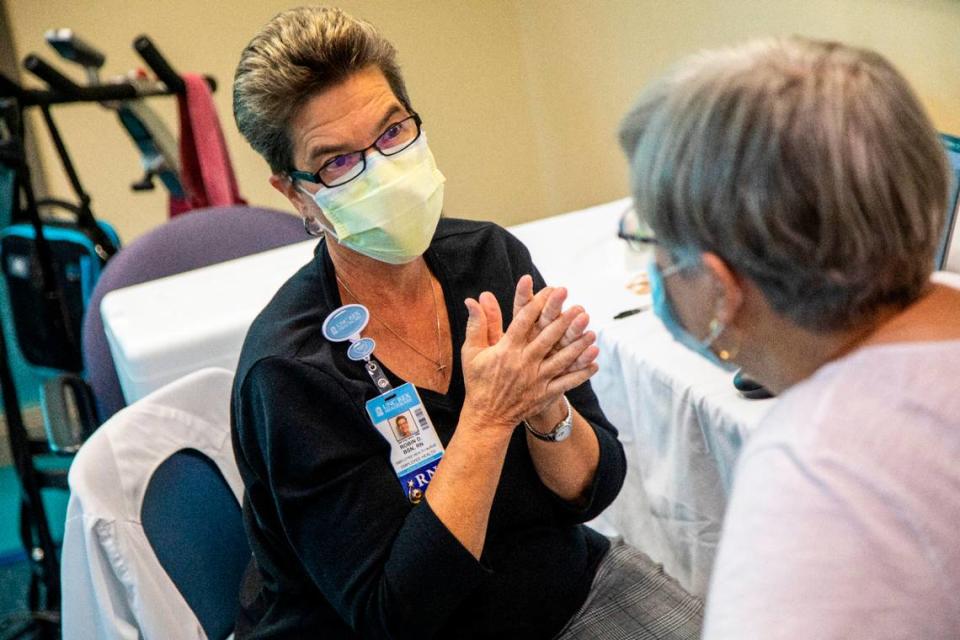With COVID still surging, UNC Health seeks ‘helping hands’ to assist front-line workers
When Robin Deal retired from nursing a few years ago, she went right back to UNC Rex hospital the next week as a volunteer, cuddling babies in the neonatal intensive care unit and giving tours of the birthing center to expecting parents.
Now, after a hiatus from volunteering brought on by the coronavirus pandemic, Deal is back at Rex, only this time the main beneficiaries of her labor are nurses and other health care workers.
Deal is one of countless people across North Carolina who have stepped up to help beleaguered hospital staffs get through the pandemic. They include retirees like her, students and faculty at medical and nursing schools, and people with no medical background at all, who simply want to lend a hand.
They helped run COVID-19 vaccination clinics early in the year. But as the pandemic dragged on and then intensified over the summer, hospitals began calling on them to help support a front-line workforce that was increasingly exhausted and often understaffed because of unusually high turnover.
A month ago, Deal began giving flu shots to Rex employees. She’s helping free up nurses who have taken on extra duties ensuring workers are vaccinated against COVID-19 and dealing with quarantines and screenings for employees exposed to the coronavirus. Deal knows the drill; she used to administer flu shots as a nurse in the Rex Women’s Center.
“Giving flu shots is old hat for me,” she said Thursday at the Rex Wellness Center of Cary, as workers lined up to get inoculated. “But it’s a way I can take the burden off the employee health nurses, so they can continue to do the volume of work that they’re doing, which is a lot, especially with people still being exposed to COVID.”
Deal’s work comes under the umbrella of UNC Health’s Helping Hands program, an effort to recruit people from the community and within the hospital system to relieve the pressure on front-line workers. While the number of COVID-19 patients is declining from last month’s peak, many hospitals are still full, partly with people who have delayed care for other conditions.
“We’re really viewing this as kind of a surge opportunity to help with this peak time in our hospital,” said Elizabeth Ramsey, who is overseeing Helping Hands at the UNC Medical Center in Chapel Hill.
Ramsey said more than 500 people have joined the effort at the medical center. They range from retired nurses who are still licensed and can spend a few hours a week caring for patients to people who answer phones or deliver blood samples to a lab.
Jill Forcina, a 20-year registered nurse, is pulling five-hour shifts each week at a UNC clinic in Chapel Hill where COVID-19 patients get infusions of monoclonal antibodies. Forcina works for N.C. AHEC, an agency that helps recruit and train health care workers for under-served areas; she last worked with patients as a part-time oncology nurse in May 2020, and says she’s happy to be pitching in.
“To be able to support the people who have really stepped up for the past year and a half, it’s an honor, really,” she said.
The monoclonal antibodies clinic where Forcina began working a month ago is another way that a disease that essentially didn’t exist two years ago has taxed the health care system.
“Most of the staff in that particular clinic was pulled from some other position,” she said. “So I don’t think that they could do it without volunteers or flexing their current staff, who are tired.”
A different kind of hospital volunteer
Hospitals have long had volunteers, mostly lay people who help at reception desks, gift shops or in other ways that don’t involve patient care.
These latest efforts are different, Ramsey said, as hospitals look for people who are either qualified to work with patients or can relieve staff members who do. And rather than long-term commitments of weeks or months, UNC doesn’t expect it will need these helping hands for long.
“This is an opportunity to come in for a shorter period of time and offer support wherever they can,” she said. “I think we anticipate this program going through the end of the year to offer assistance as we get through the surge.”
Many of the volunteers through Helping Hands, such as Forcina, are unpaid. Some are paid because of the type of work they do. That includes Deal, who expects to spend three to four days a week giving flu shots until the middle of November, the deadline for Rex employees to get inoculated.
But Deal said she would do this work for free. She says coming in to the hospital again and doing her part to help nurses and other workers through a tough time has made her feel like she did when she was still in nursing school.
“Seeing folks again, being around former colleagues, new people, just the people interaction. Oh, gosh. I get more out of this than anybody,” she said. “I just think people survive better when they feel like they have a purpose, especially in retirement.”
How to volunteer through Helping Hands
Here’s how to get more information about volunteering at UNC Health hospitals in the Triangle:
▪ UNC Medical Center in Chapel Hill and the UNC Hospitals Hillsborough campus, go to www.uncmedicalcenter.org/uncmc/support/volunteer-services/
▪ UNC Rex hospital in Raleigh, go to www.rexhealth.com/rh/volunteer/
▪ Johnston Health hospitals in Clayton and Smithfield, go to www.johnstonhealth.org/volunteer/



